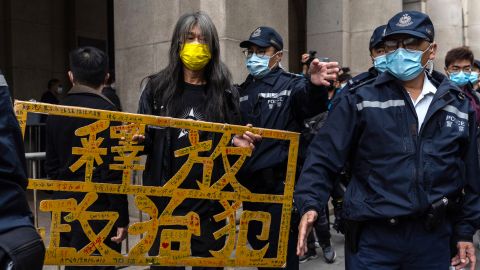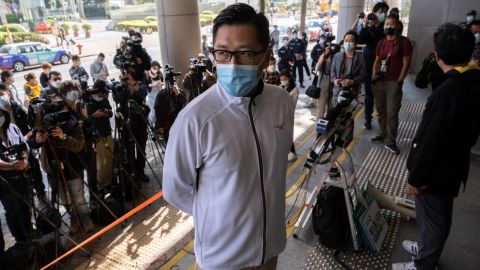Hong Kong
CNN
—
Some were seasoned politicians and veteran protest leaders. Others were academics, unionists and health care workers. They hailed from different generations and held a range of political views, but were brought together by what they say was a shared commitment to Hong Kong’s democratic future.
Now, the “Hong Kong 47,” as the group of pro-democracy activists in the semi-autonomous Chinese territory has come to be known, will start appearing in court from Monday facing charges that could send them to prison for life.
Sixteen of the defendants have pleaded not guilty to the charges laid against them and are expected to be the first ones to take the stand.
Their alleged crime? Organizing and participating in an unofficial primary election that prosecutors have called a “massive and well-organized scheme to subvert the Hong Kong government.”
This is Hong Kong’s largest national security law trial since Beijing imposed the sweeping legislation on the city following mass anti-government protests in 2019. The law criminalizes vaguely defined acts of secession, subversion, terrorism, and collusion with foreign forces, all of which are punishable by life in prison.
The landmark trial – the first involving subversion charges – is expected to run for weeks, but its implications could last for years or even decades in a city critics say is rapidly losing its political freedoms and autonomy.
John Burns, emeritus professor at the University of Hong Kong, said the trial of the democrats is a “test of will” of Beijing’s capacity to completely wipe out organized opposition in Hong Kong.
Burns said arresting the democrats and pressing charges against them was meant to both intimidate and eliminate the opposition, either by chasing them out of Hong Kong into exile or by jailing them.
“It is a process of removing them. By shutting down political parties, shutting down trade unions, they are shutting down the basis of the support for organized opposition,” Burns said.
The Hong Kong government has repeatedly denied such accusations. Instead, it insists the law has ended chaos and restored stability to the city.
“Hong Kong prides itself on the rule of law; law enforcement agencies are duty-bound to take action against unlawful acts, regardless of the political background of the suspects. Arrests made are based on evidence and strictly in accordance with relevant laws and regulations,” the government said in a statement in response to the criticism.
Here is what you need to know about the case:
The 47 pro-democracy figures have been charged with “conspiracy to commit subversion” under the national security law over their alleged roles in an unofficial primary election in July 2020.
The vote was held ahead of a legislative election to find out which contenders would be best placed to bid against pro-Beijing candidates.
Such contests are held in democracies around the world, and involve political parties selecting the strongest candidates for an election. Hong Kong’s democrats had previously held such votes in an attempt to match the organization and discipline of the rival pro-Beijing camp and avoid splitting the opposition.
Authorities, however, said the primary vote was a “vicious plot” intended to “paralyze the government and undermine state power” by winning a majority of seats and using the mandate to block legislation.
The government’s Electoral Affairs Commission also responded that the “so-called” primaries were “not part of the electoral procedures of the Legislative Council Election or other public elections.”
In January 2021, the 47 democrats were arrested en masse in a dawn raid. Since then, many have been remanded in custody or are in jail for other protest-related offenses. Fifteen have been granted bail, but two of them breached bail conditions last year and were brought under custody, according to police.
It is extremely rare for defendants not to be granted bail in Hong Kong under the common law system. However, the national security law stipulates that defendants cannot be granted bail unless the court is convinced they will “not continue to commit acts endangering national security.”
A Department of Justice spokesman told CNN that bail application in cases concerning offenses “endangering national security” has been “handled fairly and adjudicated impartially by the court having regard to admissible evidence, applicable laws and merits of the case.”
The cases will be heard without a jury, deviating from the common law tradition. The subversion trial is being heard by a bench of three High Court Judges designated national security legislation.
The defendants include a wide variety of political activists who describe themselves as ranging from moderate democrats to radical localists, a movement that advocates Hong Kong’s independence from mainland China.
Among the 16 pleading not guilty is former journalist Gwyneth Ho, 32, of the now-defunct Stand News, which was closed down after a police raid in 2021 and two editors were charged with sedition.
Ho live-streamed the moment when assailants indiscriminately hit people – many of whom were returning from a pro-democracy march – with sticks and metal bars at a train station in July 2019. Ho’s footage of the incident made international headlines, sparking a probe into the lack of police presence. Ho was injured herself in the attack. She later stepped away from journalism to run for the 2020 Legislative Council elections.

Leung Kwok-hung, 66, nicknamed “Long Hair” for his signature locks, is a former legislator and retired civil servant. He had been on the front lines of the city’s politics for over two decades and is an outspoken critic of China. He’s known for political protests – both on the streets and inside the city’s legislative chamber. In 2017 he was disqualified from the legislature for refusing to take an oath swearing allegiance to China.

Lam Cheuk-ting, 45, regularly joined street protests which at times escalated into clashes with police, and he was often seen negotiating with officers and asking them to stop using tear gas.
He was sentenced to four months in prison in January 2020 for disclosing the personal information of individuals in a police investigation to the Yuen Long mob attack.

On the other hand, several prominent activists have pleaded guilty and await sentencing. They have either been detained under pre-trial custody or are serving jail time for other protest-related offenses.
These include well-known activist Joshua Wong, 26, labeled an “extremist” by China’s state media, and Benny Tai, 54, a former law professor and co-founder of the 2014 Occupy Central movement. Claudia Mo, 66, a former journalist-turned-legislator, who has previously been an outspoken critic of Beijing’s tightening grip over Hong Kong, has also pleaded guilty.
This story has been updated


 news
news 





